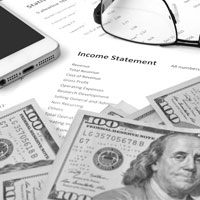 Contact
About Us
Articles
Home
Contact
About Us
Articles
Home

If you have your retirement funds in stocks or stock mutual funds, you don't need to be reminded about the steep market collapse during the first quarter of 2020 as the COVID-19 pandemic began taking a devastating toll.
If your entire portfolio is in equities, you've likely seen declines of up to 25% in its value. Even if you have your positions diversified equally between stocks and fixed income, your account total had still dipped about 15% as of the end of March.
While it's hard to find a silver lining in all this, there is one if you were considering converting your retirement savings from a traditional pre-tax IRA to a Roth IRA. In essence, the selloff has made it less expensive to make that conversion.
Think about it: If your traditional IRA account was worth $100,000 at the start of 2020 and its value has decreased by 20%, you'll owe taxes on $80,000 (instead of $100,000) when you do the conversion. Larger accounts could be saving tens of thousands of dollars in taxes by taking advantage of the downturn.
But, as they say, the devil is in the details.
The amount you convert from a traditional IRA to a Roth is added to your gross income for that tax year. You pay your ordinary tax rate on the conversion, but if you convert too much money in that year, you could end up in a higher tax bracket, making the conversion even more expensive.
Some financial experts recommend splitting the conversion over two or more years to keep you from creeping into the next bracket.
Say you want to convert $80,000 to a Roth IRA, and you're in the 22% federal tax bracket. Your bill to the IRS would be $17,600. The most effective way to pay the tax on your conversion is by using savings that are outside of a retirement account.
If you choose to pay your tax from your IRA, you would now have a balance of $62,400 in your Roth. If that balance grows at a 7% rate of return, you'd have a little over $250,000 after 20 years. However, if you can pay the taxes from a non-qualified account and leave the full $80,000 in your Roth, you would have accumulated almost $325,000 in those same 20 years!
If you convert to a Roth before you turn 59.5 years of age, it becomes even more expensive if you use your IRA to pay the tax. That's because the money you withdraw to pay them will be subject to a 10% penalty, so there will be an extra $1,760 tacked on to the amount due.
While it may be preferable to pay for the conversion with funds outside the IRA, that doesn't necessarily mean you shouldn't make the conversion at all if you have to use funds from a qualified account. But it does mean that you should think carefully about those tax implications and the amount of retirement money you could be sacrificing.
Investors should gauge a conversion mostly on tax rates. Do you believe your tax rate is lower now than it will be in retirement? Then a conversion probably makes sense. Despite what you might have heard, you can't count on your tax rate being lower in retirement.
Right now, tax rates are low by historical standards. Take a look at this table:
| Calendar Year | Rate (percent) | Taxable income up to |
|---|---|---|
| Calendar Year2020 | Rate (percent)10 | Taxable income up to$19,400 |
| Calendar Year2000 | Rate (percent)15 | Taxable income up to$43,850 |
| Calendar Year1980 | Rate (percent)14.2 | Taxable income up to$2,100 |
| Calendar Year1965 | Rate (percent)14 | Taxable income up to$1,000 |
| Calendar Year1950 | Rate (percent)17.4 | Taxable income up to$4,000 |
| Calendar Year1945 | Rate (percent)23 | Taxable income up to$2,000 |
| Calendar Year | Rate (percent) | Taxable income up to |
|---|---|---|
| Calendar Year2020 | Rate (percent)37 | Taxable income up to$622,050 |
| Calendar Year2000 | Rate (percent)39.6 | Taxable income up to$288,350 |
| Calendar Year1980 | Rate (percent)70 | Taxable income up to$212,000 |
| Calendar Year1965 | Rate (percent)70 | Taxable income up to$200,000 |
| Calendar Year1950 | Rate (percent)87 | Taxable income up to$400,000 |
| Calendar Year1945 | Rate (percent)88 | Taxable income up to$200,000 |
Although nothing is certain, tax rates are far more likely to go up in the future. As of early 2020, the federal budget deficit was around $1.1 trillion, and the government could be compelled to boost revenues with tax increases.
It's officially called the Setting Every Community Up for Retirement Enhancement Act of 2019, but you probably know it as the SECURE Act. And two provisions of it can play a part in your decision to move forward with a Roth conversion:
First, the Act eliminated the so-called "stretch IRA," a strategy that investors used to pass tax-advantaged money to their non-spouse beneficiaries — usually children and grandchildren. It allowed them to withdraw money from an inherited IRA gradually over their lifetimes. The SECURE Act now requires most IRAs inherited by people other than spouses to be depleted within ten years, resulting in considerably higher tax bills for the heirs.
Using a Roth IRA to pass money to the next generation has been the favored method, and even though these accounts also come under the 10-year rule, it still makes sense. Since these distributions from a Roth account are tax-free, beneficiaries can let their Roth accounts grow and take the full distribution in year 10 without tax consequences. The accelerated income schedule for beneficiaries makes it even more strategic to pass along Roth assets as opposed to traditional assets.
The second provision increased the age when mandatory distributions must be taken from 70.5 to 72. This delay in required minimum distributions (RMDs) can be expected to result in more significant account balances at the time of RMD, meaning more tax liability for non-spousal beneficiaries who probably are in their peak earning years.
For older Americans, converting to a Roth makes perfect sense right after retirement, but before RMDs begin. Tax brackets often go down at this time, and they can spread the conversion over several years to make managing the tax bill easier. And with the new higher age for required minimum distributions, people have even more time to make the multiple conversions.
Besides a downturn in the market, there are other factors to consider before deciding to do a Roth conversion, being able to pay the taxes from a non-qualified account being one of the primary considerations.
But with all the unsettling news in the market, this could be the bright spot that offers an opportunity that might not be around for long - at least we all hope not.
Alliance America is an insurance and financial services company. Our financial professionals can assist you in maximizing your retirement resources and achieving your future goals. We have access to an array of products and services, all focused on helping you enjoy the retirement lifestyle you want and deserve. You can request a no-cost, no-obligation consultation by calling (833) 219-6884 today.


